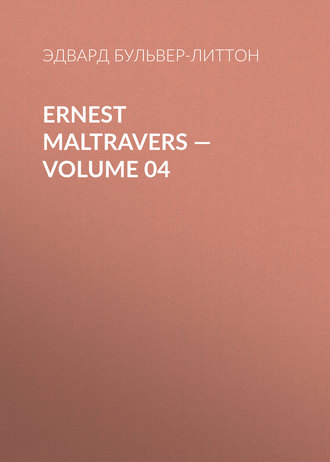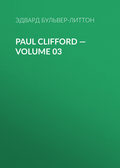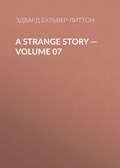
Эдвард Бульвер-Литтон
Ernest Maltravers — Volume 04
"And he may marry her after all—this Mr. Butler."
"Heaven forbid—the villain!—Well, madam, I will see to this poor young thing—she shall not want a guide."
"Heaven reward you! How wicked some people are to call you severe!"
"I can bear /that/ blame with a meek temper, madam. Good day."
"Good day. You will remember how strictly confidential has been our conversation."
"Not a breath shall transpire. I will send you some tracts to-morrow—so comforting. Heaven bless you!"
This difficulty smoothed, Mrs. Leslie, to her astonishment, found that she had another to contend with in Alice herself. For, first, Alice conceived that to change her name and keep her secret was to confess that she ought to be ashamed, rather than proud, of her love to Ernest, and she thought that so ungrateful to him!—and, secondly, to take his name, to pass for his wife—what presumption—he would certainly have a right to be offended! At these scruples Mrs. Leslie well-nigh lost all patience; and the banker, to his own surprise, was again called in. We have said that he was an experienced and skilful adviser, which implies the faculty of persuasion. He soon saw the handle by which Alice's obstinacy might always be moved—her little girl's welfare. He put this so forcibly before her eyes; he represented the child's future fate as resting so much, not only on her own good conduct, but on her outward respectability, that he prevailed upon her at last; and, perhaps, one argument that he incidentally used, had as much effect on her as the rest. "This Mr. Butler, if yet in England, may pass through our town—may visit amongst us—may hear you spoken of by a name similar to his own, and curiosity would thus induce him to seek you. Take his name, and you will always bear an honourable index to your mutual discovery and recognition. Besides, when you are respectable, honoured, and earning an independence, he may not be too proud to marry you. But take your own name, avow your own history, and not only will your child be an outcast, yourself a beggar, or, at best, a menial dependant, but you lose every hope of recovering the object of your too-devoted attachment."
Thus Alice was convinced. From that time she became close and reserved in her communications. Mrs. Leslie had wisely selected a town sufficiently remote from her own abode to preclude any revelations of her domestics; and, as Mrs. Butler, Alice attracted universal sympathy and respect from the exercise of her talents, the modest sweetness of her manners, the unblemished propriety of her conduct. Somehow or other, no sooner did she learn the philosophy of concealment than she made a great leap in knowledge of the world. And, though flattered and courted by the young loungers of C———, she steered her course with so much address that she was never persecuted. For there are few men in the world who make advances where there is no encouragement.
The banker observed her conduct with silent vigilance. He met her often, he visited her often. He was intimate at houses where she attended to teach or perform. He lent her good books—he advised her—he preached to her. Alice began to look up to him—to like him—to consider him as a village girl in Catholic countries may consider a benevolent and kindly priest. And he—what was his object?—at that time it is impossible to guess:—he became thoughtful and abstracted.
One day an old maid and an old clergyman met in the High Street of C———.
"And how do you do, ma'am?" said the clergyman; "how is the rheumatism?"
"Better, thank you, sir. Any news?"
The clergyman smiled, and something hovered on his lips, which he suppressed.
"Were you," the old maid resumed, "at Mrs. Macnab's last night?
Charming music?"
"Charming! How pretty that Mrs. Butler is! and how humble! Knows her station—so unlike professional people."
"Yes, indeed!—What attention a certain banker paid her!"
"He! he! he! yes; he is very fatherly—very!"
"Perhaps he will marry again; he is always talking of the holy state of matrimony—a holy state it may be—but Heaven knows, his wife, poor woman, did not make it a pleasant one."
"There may be more causes for that than we guess of," said the clergyman, mysteriously. "I would not be uncharitable, but—"
"But what?"
"Oh, when he was young, our great man was not so correct, I fancy, as he is now."
"So I have heard it whispered; but nothing against him was ever known."
"Hem—it is very odd!"
"What's very odd?"
"Why, but it's a secret—I dare say it's all very right."
"Oh, I sha'n't say a word. Are you going to the cathedral?—don't let me keep you standing. Now, pray proceed!"
"Well, then, yesterday I was doing duty in a village more than twenty miles hence, and I loitered in the village to take an early dinner; and, afterwards, while my horse was feeding, I strolled down the green."
"Well—well?"
"And I saw a gentleman muffled carefully up, with his hat slouched over his face, at the door of a cottage, with a little child in his arms, and he kissed it more fondly than, be we ever so good, we generally kiss other people's children; and then he gave it to a peasant woman standing near him, and mounted his horse, which was tied to the gate, and trotted past me; and who do you think this was?"
"Patience me—I can't guess!"
"Why, our saintly banker. I bowed to him, and I assure you he turned as red, ma'am, as your waistband."
"My!"
"I just turned into the cottage when he was out of sight, for I was thirsty, and asked for a glass of water, and I saw the child. I declare I would not be uncharitable, but I thought it monstrous like—you know whom!"
"Gracious! you don't say—"
"I asked the woman 'if it was hers?' and she said 'No,' but was very short."
"Dear me, I must find this out! What is the name of the village?"
"Covedale."
"Oh, I know—I know."
"Not a word of this; I dare say there is nothing in it. But I am not much in favour of your new lights."
"Nor I neither. What better than the good old Church of England?"
"Madam, your sentiments do you honour; you'll be sure not to say anything of our little mystery."
"Not a syllable."
Two days after this three old maids made an excursion to the village of Covedale, and lo! the cottage in question was shut up—the woman and the child were gone. The people in the village knew nothing about them—had seen nothing particular in the woman or child—had always supposed them mother and daughter; and the gentleman identified by the clerical inquisitor with the banker had never but once been observed in the place.
"The vile old parson," said the eldest of the old maids, "to take away so good a man's character!—and the fly will cost one pound two, with the baiting!"
CHAPTER VI
"In this disposition was I, when looking out of my window one day to take the air, I perceived a kind of peasant who looked at me very attentively."—GIL BLAS.
A SUMMER'S evening in a retired country town has something melancholy in it. You have the streets of a metropolis without their animated bustle—you have the stillness of the country without its birds and flowers. The reader will please to bring before him a quiet street in the quiet country town of C———, in a quiet evening in quiet June; the picture is not mirthful—two young dogs are playing in the street, one old dog is watching by a newly-painted door. A few ladies of middle age move noiselessly along the pavement, returning home to tea: they wear white muslin dresses, green spencers a little faded, straw poke bonnets with green or coffee-coloured gauze veils. By twos and threes they have disappeared within the thresholds of small neat houses, with little railings, inclosing little green plots. Threshold, house, railing, and plot, each as like to the other as are those small commodities called "nest-tables," which, "even as a broken mirror multiplies," summon to the bewildered eye countless iterations of one four-legged individual. Paradise Place was a set of nest houses.
A cow had passed through the streets with a milkwoman behind; two young and gay shopmen "looking after the gals," had reconnoitred the street, and vanished in despair. The twilight advanced—but gently; and though a star or two were up, the air was still clear. At the open window of one of the tenements in this street sat Alice Darvil. She had been working (that pretty excuse to women for thinking), and as the thoughts grew upon her, and the evening waned, the work had fallen upon her knee, and her hands dropped mechanically on her lap. Her profile was turned towards the street; but without moving her head or changing her attitude, her eyes glanced from time to time to her little girl, who nestled on the ground beside her, tired with play; and wondering, perhaps, why she was not already in bed, seemed as tranquil as the young mother herself. And sometimes Alice's eyes filled with tears—and then she sighed, as if to sigh the tears away. But poor Alice, if she grieved, hers was now a silent and a patient grief.
The street was deserted of all other passengers, when a man passed along the pavement on the side opposite to Alice's house. His garb was rude and homely, between that of a labourer and a farmer; but still there was an affectation of tawdry show about the bright scarlet handkerchief, tied, in a sailor or smuggler fashion, round the sinewy throat; the hat was set jauntily on one side, and, dangling many an inch from the gaily-striped waistcoat, glittered a watch-chain and seals, which appeared suspiciously out of character with the rest of his attire. The passenger was covered with dust; and as the street was in a suburb communicating with the high-road, and formed one of the entrances into the town, he had probably, after long day's journey, reached his evening's destination. The looks of this stranger wore anxious, restless, and perturbed. In his gait and swagger there was the recklessness of the professional blackguard; but in his vigilant, prying, suspicious eyes there was a hang-dog expression of apprehension and fear. He seemed a man upon whom Crime had set its significant mark—and who saw a purse with one eye and a gibbet with the other. Alice did not note the stranger, until she herself had attracted and centred all his attention. He halted abruptly as he caught a view of her face—shaded his eyes with his hands as if to gaze more intently—and at length burst into an exclamation of surprise and pleasure. At that instant Alice turned, and her gaze met that of the stranger. The fascination of the basilisk can scarcely more stun and paralyse its victim than the look of this stranger charmed, with the appalling glamoury of horror, the eye and soul of Alice Darvil. Her face became suddenly locked and rigid, her lips as white as marble, her eyes almost started from their sockets—she pressed her hands convulsively together, and shuddered—but still she did not move. The man nodded, and grinned, and then, deliberately crossing the street, gained the door, and knocked loudly. Still Alice did not stir—her senses seemed to have forsaken her. Presently the stranger's loud, rough voice was heard below, in answer to the accents of the solitary woman-servant whom Alice kept in her employ; and his strong, heavy tread made the slight staircase creak and tremble. Then Alice rose as by an instinct, caught her child in her arms, and stood erect and motionless facing the door. It opened—and the FATHER and DAUGHTER were once more face to face within the same walls.
"Well, Alley, how are you, my blowen?—glad to see your old dad again, I'll be sworn. No ceremony, sit down. Ha, ha! snug here—very snug—we shall live together charmingly. Trade on your own account—eh? sly!—well, can't desert your poor old father. Let's have something to eat and drink."
So saying, Darvil threw himself at length upon the neat, prim little chintz sofa, with the air of a man resolved to make himself perfectly at home.
Alice gazed, and trembled violently, but still said nothing—the power of voice had indeed left her.
"Come, why don't you stir your stumps? I suppose I must wait on myself—fine manners!—But, ho, ho—a bell, by gosh—mighty grand—never mind—I am used to call for my own wants."
A hearty tug at the frail bell-rope sent a shrill alarum half-way through the long lath-and-plaster row of Paradise Place, and left the instrument of the sound in the hand of its creator.
Up came the maid-servant, a formal old woman, most respectable.
"Hark ye, old girl!" said Darvil; "bring up the best you have to eat—not particular—let there be plenty. And I say—a bottle of brandy. Come, don't stand there staring like a stuck pig. Budge! Hell and furies! don't you hear me?"
The servant retreated, as if a pistol had been put to her head, and Darvil, laughing loud, threw himself again upon the sofa. Alice looked at him, and, still without saying a word, glided from the room—her child in her arms. She hurried down-stairs, and in the hall met her servant. The latter, who was much attached to her mistress, was alarmed to see her about to leave the house.
"Why, marm, where be you going? Dear heart, you have no bonnet on!
What is the matter? Who is this?"
"Oh!" cried Alice, in agony; "what shall I do?—where shall I fly?" The door above opened. Alice heard, started, and the next moment was in the street. She ran on breathlessly, and like one insane. Her mind was, indeed, for the time, gone; and had a river flowed before her way, she would have plunged into an escape from a world that seemed too narrow to hold a father and his child.
But just as she turned the corner of a street that led into the more public thoroughfares, she felt her arm grasped, and a voice called out her name in surprised and startled accents.
"Heavens, Mrs. Butler! Alice! What do I see? What is the matter?"
"Oh, sir, save me!—you are a good man—a great man—save me—he is returned!"
"He! who? Mr. Butler?" said the banker (for that gentleman it was) in a changed and trembling voice.
"No, no—ah, not he!—I did not say /he/—I said my father—my, my—ah—look behind—look behind—is he coming?"
"Calm yourself, my dear young friend—no one is near. I will go and reason with your father. No one shall harm you—I will protect you. Go back—go back, I will follow—we must not be seen together." And the tall banker seemed trying to shrink into a nutshell.
"No, no," said Alice, growing yet paler, "I cannot go back."
"Well, then, just follow me to the door—your servant shall get you your bonnet, and accompany you to my house, where you can wait till I return. Meanwhile I will see your father, and rid you, I trust, of his presence."
The banker, who spoke in a very hurried and even impatient voice, waited for no reply, but took his way to Alice's house. Alice herself did not follow, but remained in the very place where she was left, till joined by her servant, who then conducted her to the rich man's residence. . . But Alice's mind had not recovered its shock, and her thoughts wandered alarmingly.







